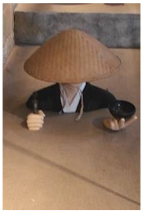Tzeddakah and Chessed are different. They produce different results.
Parshat Eikev 5774 ©
Rabbi David Lapin, 2014 Permission Granted
 |
| Tzeddakah Box |
You know the story of The Giving Tree? It’s a charming
children’s book [written by Shel Silverstein] about a lifetime’s relationship between a boy and an apple
tree. The boy plays in the shade of an apple tree and climbs its branches. When
he grows up and no longer wants to play, the tree gives him its apples so that
he can sell them and earn money. Later, when the boy wants a house the tree
offers him its branches with which to build a home and then its trunk with
which to build a boat. Finally, the tree, having given the boy all of its
resources, has nothing more to offer him other than the stub of its trunk on
which to sit in his old age.
The idea of generosity that the book illustrates it is not the
Jewish idea of generosity. The book teaches unconditional generosity, a
Christian idea, not a Jewish one.
The Torah differentiates between two distinct
expressions of generosity: Generous donations to a cause or a person, and
generous investment in the growth and development of others. Charity is tzedakkah; investment is chessed. Unconditional (and
at times even anonymous) charity is generous. Unconditional investment is not.
The boy – and the world – would have benefitted more from the
tree had the tree required that the boy replant some of its apple seeds and
grows more trees. The tree could have insisted that the boy show gratitude and
that he pays the tree’s kindness forward by showing similar kindness to others.
This would have been a truly generous investment in another. As it is, the tree
simply gave the boy charity and eventually depleted itself. Unconditional
giving is not sustainable, which is why the Torah limits it to twenty percent
of assets or income.
Investment in others, on the other hand, is not only sustainable
it is regenerative and the Torah does not cap it. Olam chessed yibaneh: the world continues
to be built and rebuilt through chessed – investment in others. Investors
have expectations of those who benefit from their generosity; they expect
growth and returns. Not only are these expectations legitimate, they also
inspire the very growth and development that was the purpose of the investment
to begin with.
In my last essay, “So What Now?” I wrote about
the attractiveness of matnat chinam. You will have noticed that I deliberately
chose not to translate this idea as unconditional giving but rather as unearned giving. The reason is
because matnat chinam is a gift given to someone not because they had
previously done something to earn it but given to someone who has thus far done
nothing at all to earn it. However, matnat chinam does not imply a
gift with no expectation of gratitude or reciprocation in the
future. That would be charity. Charity, a noble midah and necessary
social responsibility, does not build society; it simply preserves society.
Investment in others, and expecting reciprocal returns on that investment,
actually builds a society.
The purpose of the Creation was not so that Hashem could provide
us with unconditional charity. Unconditional charity is nahama de’kissufa, as Rabeinu Sa’adia Gaon
terms it. Were we to be the recipients of free handouts we could not built our
dignity and our stature; our journey on earth would be pointless. Hashem
created the world, the Gaon says, so that Hashem could invest in us expecting
us to reciprocate with our Avodah (service) – serving Him and providing a
service to one another. In this way we could earn His ultimate generosity in
olam habbah and we would not experience it as undignified nahama de’kissufa.
This theme is emphasized over and over again in the Torah and
specifically in the parsha. The parsha’s very name, Eikev, implies the
conditionality of investment: You serve me properly and deal justly and kindly
with others, I will continue to shower you and your land with abundant
blessing.
Our nation is emerging out of a relatively peaceful era of some
seventy years during the non-Jewish world, shamed by the holocaust tolerated us
and the excellence of our accomplishments. Now we are starting to irritate the
world again, and their irritation is erupting into flashes of vile
anti-semitism not seen since the war. We cannot take God’s protection for
granted; it is not an unconditional handout of charity. We have just
experienced miracle after miracle in Israel, Hashem expects us to reciprocate
with higher standards of avodah, limud Torah and service to
others. Some of us can inspire this reciprocation on large scales, others can
do it within themselves and their immediate spheres of influence.
Whatever your capability, what are you doing to reciprocate to Hashem? What are you and I doing to earn God’s continuing protection and blessing as our nation moves into a new era of independence, accomplishment, influence and global resentment? How are we showing ever greater Hakkarat hatov (gratitude) to Hashem for our being given the opportunity to live in one of the most stunning eras of modern Jewish history?
Whatever your capability, what are you doing to reciprocate to Hashem? What are you and I doing to earn God’s continuing protection and blessing as our nation moves into a new era of independence, accomplishment, influence and global resentment? How are we showing ever greater Hakkarat hatov (gratitude) to Hashem for our being given the opportunity to live in one of the most stunning eras of modern Jewish history?
The Giving Tree took more than it gave. It gave the boy shade,
and apples and wood. But it took away his dignity and his potential to grow in
the most important midah of all: Hakkarat hatov – gratitude, the
very stuff of relationship (with God and with fellow men), kindness and society
itself.
For more insights from Rabbi Lapin, see his iAwaken website.
